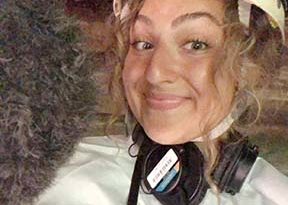By Cassidy Hough
This summer I landed an awesome internship despite not being totally qualified. I was the environmental news intern for Interlochen Public Radio, the National Public Radio member network for Northern Michigan.
My first piece of advice is to apply apply apply. Don’t put all your eggs in one basket for that perfect internship that you’re 100% qualified for, because odds are there’s 100 other qualified people applying for that same internship.
I had no radio experience at all before this internship, but I did have a good amount of environmental reporting under my belt. I took Environmental Reporting (JRN 472) my freshman year, where I produced a handful of environmental stories for Great Lakes Echo, and then continued working for Echo throughout my sophomore year.
I knew I was underqualified, so I met with some of my journalism professors to perfect my resume before applying, and to prepare for interviews after applying. Thanks to some references that spoke highly of me and a few smooth interviews, I was offered the position.

Cassidy Hough
I moved up north in May to live in a cabin on the beautiful Interlochen Center for the Arts campus. Not only did I live alone, but I was one of the only people living on the entire campus since the summer camp was cancelled, so this was next level isolation. The radio station was across the street, but because of COVID, I think I only actually went into the office four times.
Most days were spent sitting in front of my living room window in the same cloths as the day before listening to the IPR station as I worked on either a spot or a feature. I had never made cold-calls to sources before, and I was pretty nervous to do so, but I ended up doing them so often that they actually became fun. I often found myself asking my sources more than I needed to out of personal interest, and establishing these relationships with my sources made it easier to give them a call back if I ever had a similar story pop-up. I actually think cold-calling kept me sane since I went most days without much human interaction, and I think my sources appreciated my eagerness to talk to them.
The internship got off to a rocky start when the person who was supposed to be my supervisor was fired the day I moved in, but the IPR news team did a great job handling it. No one quite knew what to do with me the first week or so, so I ended up being treated like a regular staffer. My very first day on the job, Gov. Gretchen Whitmer announced she was going to reopen parts of Northern Michigan, so I produced a spot on how privately-owned campground owners felt about being left out of this reopening. I didn’t even know what a “spot” was at this point, but in hindsight, it was a great way to learn. To be honest, I was really thrown in the deep end and I often felt like I was just barely keeping my head above water, but IPR made sure I never drowned. I was often referred to as, “Cassidy, the neglected intern,” when I was assigned tasks that I was never formally taught how to complete, but everyone was always more than willing to help me out, so I never felt like a burden. In fact, not having a supervisor ended up working out for the best, because it allowed me to work much closer with many other members on the news team.
The biggest challenge was absolutely overcoming COVID. I missed out on a lot by not being able to come into the station, so I wasn’t able to learn as much about the equipment or hosting as I had hoped. Working alone in my house everyday also got tedious, and I wish I would have gotten the full experience of working in a bustling office with other reporters.
However, COVID did not prevent my first work trip. IPR sent me all the way up to Iron Mountain in the Upper Peninsula to conduct an interview and get cave audio for a story I did on white-nose syndrome in bats. It was easily the highlight of the internship. I got to climb around a giant cave suited up in protective gear and recording equipment, and I felt like a National Geographic Reporter. I later did another story on mute swans, where I was sent out on a day-trip to the beautiful Arcadia Marsh to interview a bird expert. These were both feature stories I did, and probably the ones I’m most proud of.
I think this internship gave me some great insight into what could potentially be the future of journalism, and despite the bumps in the road, I can confidently say the obstacles only made me into a better journalist.
